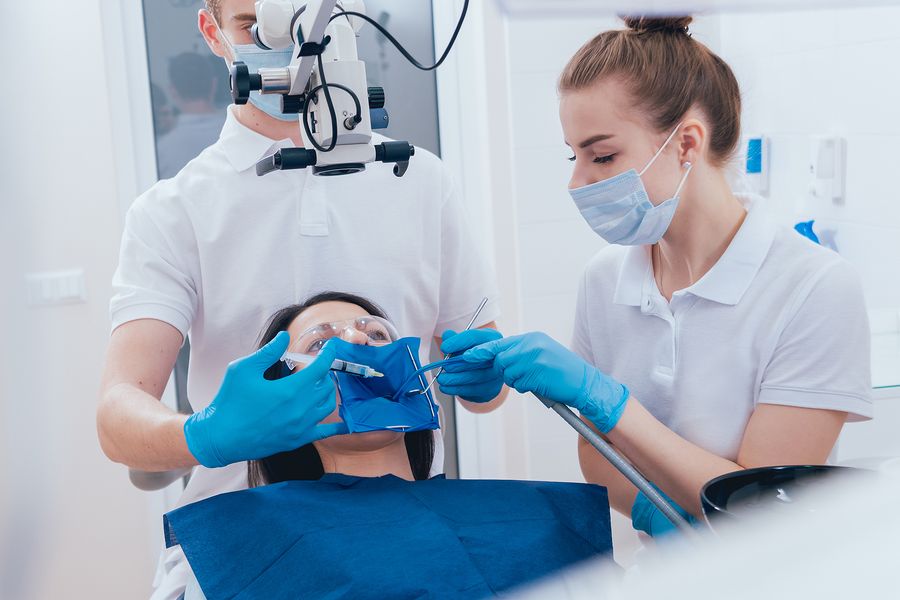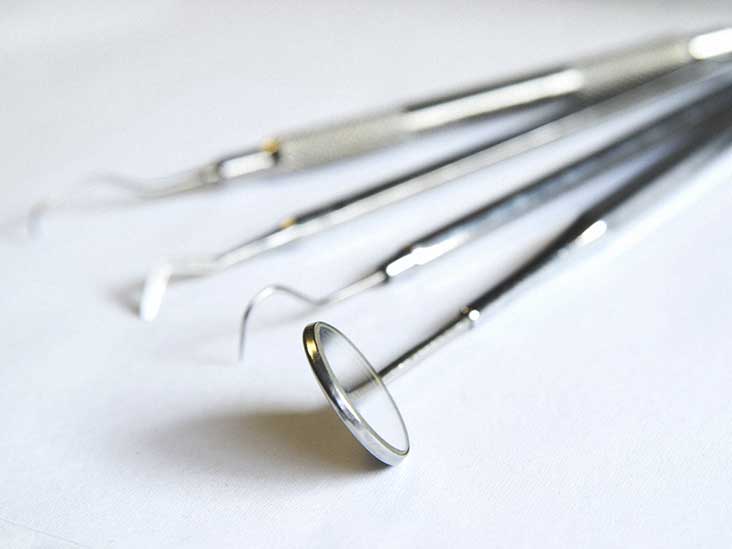You are looking for information, articles, knowledge about the topic nail salons open on sunday near me how long does it take to heal from root canal on Google, you do not find the information you need! Here are the best content compiled and compiled by the https://chewathai27.com team, along with other related topics such as: how long does it take to heal from root canal how long does it take for a root canal, how long does it take to recover from a root canal and crown, how long does a root canal hurt, can a root canal take months to heal, how long after root canal can i eat, root canal recovery, signs of infection after root canal, root canal treatment side effects:
How long does root canal recovery take? Typically, root canal recovery time lasts less than a week. Mild discomfort may be present for a few days, but this can be managed with medication. If you have severe pain or discomfort that lasts longer than a week, call your healthcare provider.In most cases, patients require only a few days to recover from a root canal procedure. After the procedure, the patient may feel some irritation or soreness for the first 24 to 48 hours. To manage this pain and soreness, your dentist will prescribe over-the-counter pain medication.A successful root canal can cause mild pain for a few days. This is temporary, and should go away on its own as long as you practice good oral hygiene. You should see your dentist for a follow-up if the pain lasts longer than three days.
- Very hot and very cold foods and beverages, which can irritate sensitive teeth.
- Sticky foods like gum, caramels, and other candies.
- Chewy foods like steak and crusty bread.
- Hard foods like nuts.
- Crunchy foods like pretzels and tortilla chips.
- Keep your head elevated and don’t eat right away. …
- Take pain medication. …
- Gargle warm salt water. …
- Eat ice cream and use a cold compress. …
- Avoid anything that could cause inflammation. …
- Avoid strenuous activity for a couple days. …
- Know what to expect. …
- Call your dentist if you’re worried.
Contents
How long after a root canal until it feels normal?
In most cases, patients require only a few days to recover from a root canal procedure. After the procedure, the patient may feel some irritation or soreness for the first 24 to 48 hours. To manage this pain and soreness, your dentist will prescribe over-the-counter pain medication.
How long does the pain last after a root canal?
A successful root canal can cause mild pain for a few days. This is temporary, and should go away on its own as long as you practice good oral hygiene. You should see your dentist for a follow-up if the pain lasts longer than three days.
What can you not do after a root canal?
- Very hot and very cold foods and beverages, which can irritate sensitive teeth.
- Sticky foods like gum, caramels, and other candies.
- Chewy foods like steak and crusty bread.
- Hard foods like nuts.
- Crunchy foods like pretzels and tortilla chips.
How can I make my root canal heal faster?
- Keep your head elevated and don’t eat right away. …
- Take pain medication. …
- Gargle warm salt water. …
- Eat ice cream and use a cold compress. …
- Avoid anything that could cause inflammation. …
- Avoid strenuous activity for a couple days. …
- Know what to expect. …
- Call your dentist if you’re worried.
How do I know if my root canal failed?
The signs of a root canal failure may include: Sensitivity when biting down. A pimple or boil on the jaw. Discoloration of the tooth.
Do teeth feel different after root canal?
It is very normal for teeth to feel “different” after RCT. “Different” is normal as long as you are not experiencing substantial discomfort. Your tooth may also be “shorter” than the neighboring teeth to allow for healing.
What pain is normal after root canal?
Some Minor Pain Is Normal After Root Canal Treatment
If you have had a root canal in the last few days and you’re experiencing some minor pain, discomfort, and inflammation, this is nothing to worry about. This is normal and a relatively common issue.
Do I need antibiotics after root canal?
Antibiotics are not absolutely necessary after a root canal. After a root canal, you need very little time to recover, and post-operative care is the best way for fast healing. However, a dentist may recommend antibiotics before root canal to improve the chances of a successful outcome.
How long can I wait to get a crown after a root canal?
It can take up to two weeks for the patient’s customized crown to be ready. The patient goes in for a second appointment when that occurs. The dentist removes the temporary crown and cements the permanent crown into place.
How do you brush your teeth after a root canal?
Brush and floss gently
It is important to keep the area clean after a root canal treatment. However, aggressive brushing puts too much stress on the treated area and can dislodge the temporary filling or crown. Using a soft-bristled brush, gently clean the tooth and then floss. Do not force the floss between the teeth.
Why does my jaw hurt after root canal?
As your body heals, the area around the tooth might feel a bit sore and tender, explains Bupa. Some people also have a sore jaw after their root canals, since the procedure requires them to have their mouths open for a longer period of time. If you have moderate pain, over-the-counter pain relief may help.
Is there any side effects of root canal?
In an extremely small percentage of patients, the surrounding nerves around the affected tooth can be disrupted by the root canal procedure. In some cases, this can cause numbness in that area. This is nothing to worry about – it usually goes away within a few weeks.
Why does root canal Take 2 sessions?
The root canal procedure is completed in two separate visits to ensure that the tooth is thoroughly cleaned out, sealed up, and protected from further damage.
How should you feel after a root canal?
Some Minor Pain Is Normal After Root Canal Treatment
Soon, the discomfort will go away, but until then, you can take over-the-counter pain relievers like ibuprofen or acetaminophen. There are a few reasons that you may experience some pain even though the nerve of your tooth has been removed during root canal therapy.
Is it normal to have some pain after a root canal?
Once the local anesthetic wears off after your root canal procedure, you may have mild pain or sensitivity. The pain should only last a few days. If you experience severe pain, or think you may have a complication, we encourage you to come back to be seen right away.
Why does my tooth hurt if I had a root canal?
Once a tooth has a root canal it is brittle because the blood supply to the tooth has been filled in. It’s still possible to bite down and crack the root or an existing crack under the crown may grow down the root. This may cause pain when biting down on the crown in certain ways. Sometimes the pain will come and go.
Why does my head hurt after root canal?
If an infection does develop, root canal therapy is usually a requirement, but if treatment doesn’t come fast enough, the infection is aggressive, or your tooth roots penetrate the sinus cavity, it can spread to your sinuses, making you feel like you have a terrible sinus headache.
Root Canal: What Is It, Diagnosis, Treatment, Side Effects & Recovery
- Article author: my.clevelandclinic.org
- Reviews from users: 49237
Ratings
- Top rated: 4.0
- Lowest rated: 1
- Summary of article content: Articles about Root Canal: What Is It, Diagnosis, Treatment, Side Effects & Recovery Updating …
- Most searched keywords: Whether you are looking for Root Canal: What Is It, Diagnosis, Treatment, Side Effects & Recovery Updating Root canal therapy is used to treat an infected or abscessed tooth. It eliminates infection by removing the nerves and tissues inside of a tooth.
- Table of Contents:
Overview
Procedure Details
Risks Benefits
Recovery and Outlook
When to Call the Doctor
More health news + info

How long does it take to recover from a root canal? | PS Dental Tigard, OR
- Article author: www.psdentalservices.com
- Reviews from users: 19069
Ratings
- Top rated: 4.2
- Lowest rated: 1
- Summary of article content: Articles about How long does it take to recover from a root canal? | PS Dental Tigard, OR Updating …
- Most searched keywords: Whether you are looking for How long does it take to recover from a root canal? | PS Dental Tigard, OR Updating Are you suffering from throbbing pain, and your dentist has suggested you have a root canal treatment? Do you have worries about the procedure? We understand – root canal procedures can cause worry to some people as it is an invasive procedure that m…Dentist, Tigard, Oregon, PS Dental
- Table of Contents:

Pain After Root Canal: What to Expect and When to Seek Help
- Article author: www.healthline.com
- Reviews from users: 46229
Ratings
- Top rated: 4.7
- Lowest rated: 1
- Summary of article content: Articles about Pain After Root Canal: What to Expect and When to Seek Help Updating …
- Most searched keywords: Whether you are looking for Pain After Root Canal: What to Expect and When to Seek Help Updating Pain after a root canal is normal, but it may also indicate the need for additional treatment.pain after root canal
- Table of Contents:
Initial recovery period
When to seek help
Pain management
Outlook
Tips for oral health

What to Eat After a Root Canal | Greater Boston, MA
- Article author: www.nsbendo.com
- Reviews from users: 20111
Ratings
- Top rated: 3.6
- Lowest rated: 1
- Summary of article content: Articles about What to Eat After a Root Canal | Greater Boston, MA Updating …
- Most searched keywords: Whether you are looking for What to Eat After a Root Canal | Greater Boston, MA Updating Learn what to eat after a root canal. Contact NSBENDO in Greater Boston, MA to schedule an appointment.
- Table of Contents:
Eating Guidelines After Root Canal Treatment
Foods to Eat After a Root Canal Procedure
Foods to Avoid After a Root Canal Procedure
Learn More About What to Do After a Root Canal

8 tips for speeding up root canal recovery
- Article author: www.citydentists.co.nz
- Reviews from users: 36759
Ratings
- Top rated: 4.5
- Lowest rated: 1
- Summary of article content: Articles about 8 tips for speeding up root canal recovery Updating …
- Most searched keywords: Whether you are looking for 8 tips for speeding up root canal recovery Updating Root canals aren’t a big deal if you take care of yourself afterwards to avoid infection and inflammation. Here are eight tips to make it easier.
- Table of Contents:

How long does it take to recover from a root canal? | PS Dental Tigard, OR
- Article author: www.psdentalservices.com
- Reviews from users: 13778
Ratings
- Top rated: 4.2
- Lowest rated: 1
- Summary of article content: Articles about How long does it take to recover from a root canal? | PS Dental Tigard, OR In most cases, patients require only a few days to recover from a root canal procedure. After the procedure, the patient may feel some … …
- Most searched keywords: Whether you are looking for How long does it take to recover from a root canal? | PS Dental Tigard, OR In most cases, patients require only a few days to recover from a root canal procedure. After the procedure, the patient may feel some … Are you suffering from throbbing pain, and your dentist has suggested you have a root canal treatment? Do you have worries about the procedure? We understand – root canal procedures can cause worry to some people as it is an invasive procedure that m…Dentist, Tigard, Oregon, PS Dental
- Table of Contents:

how long does it take to heal from root canal
- Article author: optimaldentalcenter.com
- Reviews from users: 38805
Ratings
- Top rated: 4.8
- Lowest rated: 1
- Summary of article content: Articles about how long does it take to heal from root canal While the majority of root canal cases heal in just a couple of days, some patients may experience complications such as infection. The extent of your treatment … …
- Most searched keywords: Whether you are looking for how long does it take to heal from root canal While the majority of root canal cases heal in just a couple of days, some patients may experience complications such as infection. The extent of your treatment …
- Table of Contents:

How Long Does a Root Canal Take to Heal? | Ballantyne Endodontics
- Article author: www.ballantyneendo.com
- Reviews from users: 46022
Ratings
- Top rated: 3.8
- Lowest rated: 1
- Summary of article content: Articles about How Long Does a Root Canal Take to Heal? | Ballantyne Endodontics Most patients recover from their root canal after a few days. In rare cases, some patients experience complications and may take a week or even … …
- Most searched keywords: Whether you are looking for How Long Does a Root Canal Take to Heal? | Ballantyne Endodontics Most patients recover from their root canal after a few days. In rare cases, some patients experience complications and may take a week or even … Do you have an upcoming root canal procedure and you are wondering how long does a root canal take to heal? We’re here to help — check out our guide today!
- Table of Contents:
Why Root Canals Are Necessary
Initial Recovery
How to Keep Your Teeth Healthy Following Your Root Canal
How Do You Know if You Need a Root Canal

How Long Does a Root Canal Take to Heal? | Ballantyne Endodontics
- Article author: www.mydentistpearland.com
- Reviews from users: 43426
Ratings
- Top rated: 4.7
- Lowest rated: 1
- Summary of article content: Articles about How Long Does a Root Canal Take to Heal? | Ballantyne Endodontics Overall, it should take you a few days to recover from a root canal. Any pain that stretches beyond that could indicate a problem. Some people … …
- Most searched keywords: Whether you are looking for How Long Does a Root Canal Take to Heal? | Ballantyne Endodontics Overall, it should take you a few days to recover from a root canal. Any pain that stretches beyond that could indicate a problem. Some people … Do you have an upcoming root canal procedure and you are wondering how long does a root canal take to heal? We’re here to help — check out our guide today!
- Table of Contents:
Why Root Canals Are Necessary
Initial Recovery
How to Keep Your Teeth Healthy Following Your Root Canal
How Do You Know if You Need a Root Canal

How Long Does It Take to Recover from a Root Canal? – Love Your Smile
- Article author: www.loveyoursmile.dentist
- Reviews from users: 2359
Ratings
- Top rated: 3.3
- Lowest rated: 1
- Summary of article content: Articles about How Long Does It Take to Recover from a Root Canal? – Love Your Smile There are moments when you’ll experience a little bit of discomfort and tenderness after the surgery. This will vary depending on the status of … …
- Most searched keywords: Whether you are looking for How Long Does It Take to Recover from a Root Canal? – Love Your Smile There are moments when you’ll experience a little bit of discomfort and tenderness after the surgery. This will vary depending on the status of … Recovery from a root canal in Lower Queen Anne may vary from patient to patient. Contact Love Your Smile today to learn more!
- Table of Contents:
Good News About Recovering from a Root Canal
Root Canal Therapy in Lower Queen Anne

How Long Does a Root Canal Take? | Root Canal Recovery Time
- Article author: www.jerseydentist.com
- Reviews from users: 34026
Ratings
- Top rated: 3.4
- Lowest rated: 1
- Summary of article content: Articles about How Long Does a Root Canal Take? | Root Canal Recovery Time For most patients, root canal recovery only takes a few days. You’ll probably experience some mild soreness for the first 24 to 48 hours after … …
- Most searched keywords: Whether you are looking for How Long Does a Root Canal Take? | Root Canal Recovery Time For most patients, root canal recovery only takes a few days. You’ll probably experience some mild soreness for the first 24 to 48 hours after … Has your dentist told you that you need a root canal to save your tooth? Here’s about how long you can expect your root canal to take.
- Table of Contents:
June 7 2021
How Root Canal Therapy Works
Factors That Affect the Length of Your Root Canal
How Long Does It Take to Recover After a Root Canal
About the Author
No Comments
Services

How Long Does It Take To Recover From A Root Canal? | NSBENDO
- Article author: www.nsbendo.com
- Reviews from users: 42087
Ratings
- Top rated: 3.6
- Lowest rated: 1
- Summary of article content: Articles about How Long Does It Take To Recover From A Root Canal? | NSBENDO Healing after a root canal is surprisingly quick. You may experience some slight swelling and sensitivity while chewing, but as long as you … …
- Most searched keywords: Whether you are looking for How Long Does It Take To Recover From A Root Canal? | NSBENDO Healing after a root canal is surprisingly quick. You may experience some slight swelling and sensitivity while chewing, but as long as you … Here’s how much time you should set aside for recovery following root canal treatment. Contact North Shore & Brookline Endodontics to learn more.
- Table of Contents:

Root Canal Recovery Time | Root Canal Treatment | Edge Dental Houston
- Article author: www.edgedentalhouston.com
- Reviews from users: 22886
Ratings
- Top rated: 4.3
- Lowest rated: 1
- Summary of article content: Articles about Root Canal Recovery Time | Root Canal Treatment | Edge Dental Houston Depending on the damaged canal, the recovery from root canal process is faster, and you should notice adequate changes after a week or two. …
- Most searched keywords: Whether you are looking for Root Canal Recovery Time | Root Canal Treatment | Edge Dental Houston Depending on the damaged canal, the recovery from root canal process is faster, and you should notice adequate changes after a week or two. Root canal treatment is very commonly dental treatment, the procedure involves extraction of badly infected tooth. The recovery time for a root canal treatment is not specific and varies from patients to patients. Know More.
- Table of Contents:
How Long Does Root Canal Treatment Take
The Root Canal Treatment

See more articles in the same category here: https://chewathai27.com/toplist.
Root Canal: What Is It, Diagnosis, Treatment, Side Effects & Recovery
Overview What is a root canal? Root canal treatment is a dental procedure that relieves pain caused by an infected or abscessed tooth. During the root canal process, the inflamed pulp is removed. The surfaces inside the tooth are then cleaned and disinfected, and a filling is placed to seal the space. When is a root canal needed? Root canal therapy is necessary when oral bacteria invade the pulp inside of your tooth. This usually happens when a cavity is left untreated for a long time. It can also occur if your tooth becomes cracked or damaged due to trauma. What are some symptoms that indicate you may need root canal treatment? In some cases, you may not know you have an infected tooth. However, many people notice certain symptoms. Signs you need a root canal include: Tooth pain that doesn’t go away: Many dental problems can cause tooth pain. If you have pain deep in your tooth, you may need root canal therapy. Discomfort may also radiate to your jaw, face or other teeth.
Many dental problems can cause tooth pain. If you have pain deep in your tooth, you may need root canal therapy. Discomfort may also radiate to your jaw, face or other teeth. Sensitivity to heat and cold: If your tooth hurts when you drink hot coffee or eat ice cream, it could mean that you need root canal treatment. This is especially true if the pain lingers for more than a few seconds.
If your tooth hurts when you drink hot coffee or eat ice cream, it could mean that you need root canal treatment. This is especially true if the pain lingers for more than a few seconds. Swollen gums: When a tooth is infected, pus can collect in the area. This can lead to puffy, swollen or tender gums.
When a tooth is infected, pus can collect in the area. This can lead to puffy, swollen or tender gums. Pimple on the gums: You may develop a pimple or boil on the gums. Pus from the infected tooth may drain from the pimple, causing an unpleasant taste or smell.
You may develop a pimple or boil on the gums. Pus from the infected tooth may drain from the pimple, causing an unpleasant taste or smell. Swollen jaw: Sometimes pus doesn’t drain from the site. As a result, your jaw may become visibly swollen.
Sometimes pus doesn’t drain from the site. As a result, your jaw may become visibly swollen. Tooth discoloration: When the pulp of a tooth becomes infected, it can cause your tooth to look darker. This occurs because of poor blood supply to the tooth.
When the pulp of a tooth becomes infected, it can cause your tooth to look darker. This occurs because of poor blood supply to the tooth. Pain when pressure is applied: If you have pain when you eat or touch your tooth, it could mean the nerves around the pulp are damaged.
If you have pain when you eat or touch your tooth, it could mean the nerves around the pulp are damaged. A chipped or cracked tooth: If you’ve cracked a tooth in an accident, when playing sports or even by biting down on something hard, bacteria can reach all the way into the tooth pulp.
If you’ve cracked a tooth in an accident, when playing sports or even by biting down on something hard, bacteria can reach all the way into the tooth pulp. Loose tooth: An infected tooth may feel looser. This is because the pus from the infected pulp can soften the bone that supports the tooth. How common is root canal therapy? According to the American Association of Endodontists, over 41,000 root canals are performed in the United States every day. That means that more than 15 million root canals are completed each year.
Procedure Details How should I prepare for root canal treatment? Before beginning your root canal, your healthcare provider can answer any questions you have about the procedure. Here are a few things you can do to prepare for your root canal treatment: Take all medications as prescribed: You may be given antibiotics or anti-inflammatory medications a few days before your appointment, especially if there is a lot of infection present.
You may be given antibiotics or anti-inflammatory medications a few days before your appointment, especially if there is a lot of infection present. Don’t smoke: Tobacco products interfere with your body’s ability to heal itself. Avoid smoking several days before your root canal appointment — and stop altogether if you’re able.
Tobacco products interfere with your body’s ability to heal itself. Avoid smoking several days before your root canal appointment — and stop altogether if you’re able. Eat a healthy meal: Since the local anesthesia used during root canal therapy will make your mouth numb for a few hours, it’s a good idea to eat before your appointment. How long does a root canal take? Depending on the amount of infection in your tooth, root canal therapy may require one or two appointments. On average, a root canal takes about 30 to 60 minutes to complete. If you are having treatment on a larger tooth with multiple roots, it can take up to an hour and a half. What happens during the root canal process? Before beginning your root canal, your healthcare provider will take dental X-rays of the affected tooth. This helps determine the extent of damage and ensures that root canal therapy is the appropriate treatment option. Here are the steps that will be completed during your root canal procedure: Anesthesia. First, local anesthesia is given to numb the infected tooth and the surrounding gums. There are also medications used in dentistry to help you relax, such as nitrous oxide, oral sedatives or intravenous (IV) sedation. Your healthcare provider may recommend sedation if you struggle with dental anxiety. Dental dam placement. Before beginning root canal treatment, a small rubber dam is placed over the area. This isolates the tooth and keeps it dry during the procedure. Access hole. Next, a small opening is made in the crown of the tooth to access the pulp. Pulp removal. Tiny dental instruments are used to remove the nerves, blood vessels and tissues inside the tooth. Shaping the canals. Once the pulp is removed, the pulp chamber and root canals are cleaned, disinfected and shaped. Filling the canals. The empty canals are then filled with a flexible, rubbery dental material called gutta-percha. Sealing the tooth. Next, a temporary dental filling is placed to seal the tooth and prevent bacteria from re-entering. Placing the final restoration. In most cases, you’ll need a dental crown to protect the treated tooth and restore your bite. Crowns are custom-made, and fabrication usually takes two to three weeks. When your crown is ready, the temporary filling is removed and the permanent crown is placed. In some instances, you may be able to receive a crown during the same appointment. Do root canals hurt? Many people are afraid they’ll have tooth pain after root canal therapy. However, because the source of infection is removed during the procedure, most people find immediate relief following treatment. If you are experiencing throbbing pain after a root canal, call your healthcare provider right away. What should I expect after a root canal? While you shouldn’t have significant pain after a root canal, you may notice sensitivity for the first few days. These symptoms are normal and can be successfully managed with prescription or over-the-counter pain relievers. In most instances, side effects lessen within one to two weeks. Who should perform my root canal procedure? Root canal treatment is completed by a general dentist or an endodontist (a root canal specialist). General dentists can often treat teeth near the front of the mouth since they have fewer roots. If you need root canal therapy on a tooth with multiple roots — or if your case is complex — then you may be referred to an endodontist.
Risks / Benefits What are the advantages of having a root canal procedure? There are several benefits to choosing root canal therapy. This treatment can: Prevent infection from spreading to other teeth.
Ease the symptoms associated with an infected tooth.
Reduce the risk of jawbone damage.
Eliminate the need for tooth extraction. Are root canals safe? Root canals are considered safe and effective. This procedure boasts impressive success rates of up to 98%. What are common failed root canal symptoms? Root canal complications can occur in some cases. This is especially true if your tooth is too damaged for this type of treatment. Failed root canal symptoms include: Pain.
Swollen gums.
Pus or drainage.
Tooth discoloration.
Pimple or boil on the gums.
Sinus problems. What if my root canal fails? If your root canal fails, your healthcare provider will explore your options with you. In some cases, root canal retreatment may be possible. Or, it may be time to discuss alternative procedures. What are the alternatives to root canal treatment? The only alternative to root canal therapy is tooth removal. Even though it’s best to save natural teeth whenever possible, extraction may be necessary to preserve your oral health. If you’re not a good candidate for root canal treatment, the tooth can be extracted and replaced with a dental implant, dental bridge or partial. To learn more about root canal vs extraction, call your healthcare provider.
Recovery and Outlook How long does root canal recovery take? Typically, root canal recovery time lasts less than a week. Mild discomfort may be present for a few days, but this can be managed with medication. If you have severe pain or discomfort that lasts longer than a week, call your healthcare provider. Can I eat after a root canal? Yes. However, it’s best to wait until the numbness wears off. The effects of the anesthesia usually last a few hours. Stick with softer foods like pastas, mashed potatoes and yogurts for the first couple of days. Introduce solid food as your comfort level improves. You should also steer clear of biting or chewing with the treated tooth. Try to chew on the other side of your mouth until your permanent dental restoration is in place. Can you drive after a root canal? It depends. If you had local anesthesia or nitrous oxide during your procedure, then you can drive yourself to and from your appointment. People who choose oral sedation or IV sedation will need a friend or family member to drive them. Can you smoke after a root canal? It isn’t recommended. Smoking interferes with healing and increases the likelihood that you’ll need more dental work in the future. When can I resume work, school or other activities? Most of the time, people who have had root canal therapy can go back to work or school the next day. However, if you’ve had sedation during your dental procedure, you may need an extra day or two to fully recover. What are some root canal aftercare tips? After root canal treatment, it’s important to keep the area clean. Brush and floss normally, and use an antibacterial mouthwash to keep germs at bay. If you still have a temporary filling placed and haven’t received your permanent crown yet, avoid chewing on the treated tooth until the crown is in place. How long do the results of a root canal last? As with all dental procedures, results are not guaranteed. However, when root canal therapy is performed correctly, results can last a long time — even the rest of your life.
How long does it take to recover from a root canal?
Are you suffering from throbbing pain, and your dentist has suggested you have a root canal treatment? Do you have worries about the procedure? We understand – root canal procedures can cause worry to some people as it is an invasive procedure that might involve extracting the infected tooth. But don’t be worried; we will help you by walking you through every step. At PS Dental, our root canal specialists use the latest dental equipment and state-of-the-art technology to achieve maximum precision in root canal procedures.
What is a root canal treatment?
Decay can cause bacteria to eat away and weaken the tooth enamel, thus reducing the protection between the tooth nerves and the outside world. Untreated, advanced decay can affect the nerves, blood vessels, and connective tissue of the teeth leading to an infection. When the infection invades the pulp and tooth root, a root canal treatment would be necessary to eliminate the infection and prevent tooth loss and other consequences.
Root canal therapy is a safe and effective procedure to eliminate dental infection and maintain the quality of the teeth.
When do we need a root canal infection?
You may be suffering from a root canal infection if you have the following symptoms:
Persistent toothache
Pain while chewing or biting
Increased tooth sensitivity
Bad breath
Swelling of lymph nodes or face
High fever
Though all these symptoms may indicate a root canal infection, only your root canal specialist can identify your needs and schedule your treatment.
How does root canal treatment work?
Root canal treatments are recommended by dentists only when no other treatments can save an infected tooth. When the dental pulp or the soft tissue in the center of a tooth becomes infected, a root canal treatment would be necessary. During the treatment, your dentist begins by administering sedation to numb the mouth. Once the sedation takes effect, the dentist creates an opening in the top of the tooth, eliminates the infected pulp, and dries the inside of the tooth. Later, the area is filled with a biocompatible substance before closing the hole. The dentist places a dental crown or a permanent filling to protect the tooth a few weeks later.
What factors affect the length of the root canal procedure?
Root canal treatment generally requires between 30 and 90 minutes and can be performed in a single visit. The different variables that can affect the duration of a root canal treatment include the following:
The severity of the root canal infection
The location of the affected tooth within the mouth
Whether the tooth needs a permanent filling or a crown later
How long does it need to recover from a root canal?
In most cases, patients require only a few days to recover from a root canal procedure. After the procedure, the patient may feel some irritation or soreness for the first 24 to 48 hours. To manage this pain and soreness, your dentist will prescribe over-the-counter pain medication. Besides, applying a cold compress can also help address these issues and assist in smooth and speedy recovery. Even during the recovery period, do not skip your daily oral hygiene practices involving brushing and daily flossing. Do not apply much pressure or chew with the treated tooth until the dental crown or filling is placed.
However, after a root canal treatment, if you continue to feel the following symptoms, contact us:
Your bite seems uncomfortable.
The swelling does not recede even after one or two days.
The temporary filling comes out.
You continue to experience swelling or pain in the gums like before the treatment.
Do you still have doubts about the root canal treatment, or are you planning to get one? Call PS Dental Family and Cosmetic Dentistry at (503) 574-4000 or schedule an appointment online.
Pain After Root Canal: What to Expect and When to Seek Help
Overview A root canal is a major procedure, so pain after a root canal is normal. A root canal involves deep cleaning inside the canals (the inner chamber of the root) of your tooth, which can in turn irritate surrounding nerves and gums. The pain shouldn’t last forever. In fact, a root canal is meant to help you avoid pain related to a decaying or fractured tooth. It’s normal to experience mild to moderate pain for a few days after a root canal. Any pain beyond this point may warrant additional cleaning of the canals or other procedures from your dentist.
Initial recovery period In the past, root canals were extremely painful. This is one reason why people sometimes avoided such procedures. Dentists now have pain-relieving measures that can be used to reduce the amount of pain you experience during the procedure. Before the process begins, your dentist will apply a local anesthetic that minimizes pain. You might still feel pressure during the cleaning, but you shouldn’t be in pain during the actual procedure. As the local anesthetic wears off after the root canal, you might experience mild pain and sensitivity. This is related to the cleaning process. During the cleaning process, your dentist makes a small opening in the crown of the tooth and cleans out diseased pulp inside the pulp chamber of the tooth. While uncomfortable, any pain and sensitivity following a root canal should only last a few days. Since the pain experienced after a root canal is usually mild, you’ll likely only need over-the-counter pain medications for relief. These include acetaminophen (Tylenol) and ibuprofen (Advil, Motrin IB). You’ll want to check with your doctor before taking these medications to make sure they don’t interact with any supplements or prescriptions you already take. You should also avoid chewing hard foods immediately following the root canal, as this can induce more pain.
When to seek help Root canal pain should decrease over time. If you still experience pain or swelling, you should see your dentist. Most people need one to two sessions for a root canal to be successful. In severe cases, you may need more cleaning sessions. Recurring pain could be an indicator of this. Your symptoms should ease up if you’re taking any over-the-counter pain medications. If they don’t, your doctor may recommend prescription-strength ibuprofen or narcotic pain relievers. These are only taken on a temporary basis. Once your tooth is completely treated, your dentist may put a crown on top of it. These can be made of metal, porcelain, or gold. The idea here is to prevent future damage to an already delicate tooth. Sometimes pain is a temporary side effect as you get used to a newly placed crown.
Pain management Pain beyond a root canal should be addressed with your dentist. Beyond taking medications temporarily, there are other things you can do to manage pain from a root canal. Taking care of your teeth is a must, and you should avoid hard and crunchy foods until your pain improves. Quitting smoking can also help. You may even consider stress-relieving activities as a method of pain management. Meditation, yoga, and tai chi are all practices that can also take your focus off of your pain.
Outlook A successful root canal can cause mild pain for a few days. This is temporary, and should go away on its own as long as you practice good oral hygiene. You should see your dentist for a follow-up if the pain lasts longer than three days. An alternative to a root canal is a tooth extraction, in which your dentist can replace a damaged tooth with a bridge, partial denture, or implant. This can be an expensive treatment and usually requires several visits to your doctor. If you’re a candidate for a root canal, you’ll likely experience less pain over time. According to the American Association of Endodontists, you’re six times more likely to be pain-free than someone who chooses not to have a root canal.
So you have finished reading the how long does it take to heal from root canal topic article, if you find this article useful, please share it. Thank you very much. See more: how long does it take for a root canal, how long does it take to recover from a root canal and crown, how long does a root canal hurt, can a root canal take months to heal, how long after root canal can i eat, root canal recovery, signs of infection after root canal, root canal treatment side effects:

